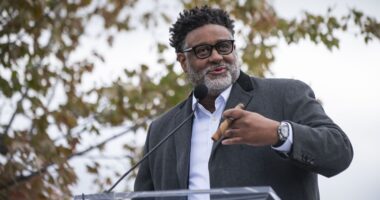In 2011, when presidential dreams were a glint in Donald Trump’s eye, a new political group invited the businessman to address a conservative convention. He wasn’t being hosted by a Christian organisation or a far-right faction. Trump’s first legitimate entrance into America’s political arena was at the behest of a gay Republican group. And according to historian and political commentator Neil J Young, this fact has been almost entirely forgotten — especially now, as Trump leans into a deeply conservative, Christian base. The invitees behind Trump’s address were Christopher R Barron and Jimmy LaSalvia, founders of GOProud. “[GOProud] was a small, gay Republican organisation that had, a year or so before, broken away from Log Cabin Republicans … [which is] the nation’s oldest and largest gay Republican organisation,” Dr Young tells ABC RN’s The Religion and Ethics Report. He says that Barron and LaSalvia considered the other group “too liberal and way too moderate”. Soon after the breakaway, GOProud attracted the attention of the Conservative Political Action Conference (CPAC). Their group was asked to not only attend the 2011 conference — a first for any LGBTQ organisation — but to co-sponsor the event. “[GOProud] knew that in order to make a real splash, they needed to bring a big name with them,” explains Dr Young. “And so … they made an invitation to Donald Trump and he agreed.” Closeted men and modern conservatism This wasn’t the first time that LGBTQ Americans had played a defining role in the direction of the Republican party. Dr Young says that the influence of the “Gay Right” can be traced back 60 years to Robert Bauman and Marvin Liebman. “Both of them were very close friends and associates of William F. Buckley Jr, who’s considered the granddaddy of modern conservativism in America,” he says. The trio helped found some of the most important organisations of the conservative movement, including the American Conservative Union and the National Review, a magazine which still exists today. Yet, Bauman and Liebman were leading double lives. “[As] a devout Catholic, [Bauman] marries a very important right-wing activist and they have four children,” says Dr Young. Liebman, meanwhile, married a woman named Patsy in 1945, but their union was annulled later that year. Both men were fiercely anti-communist, and this was a key reason why they stayed closeted. From the late 1940s until the 1960s, the American government was forcing thousands of gay employees out of their jobs. It was called the Lavender Scare, and it was rooted in the belief that “homosexuals were subversives and were possible communist converts,” Dr Young explains. For Bauman and Liebman, this state overreach was worth the impediment to gay workers. “They believed that the government, in rooting out communists, could defend individual rights — and that through individual rights, [every]one could have freedom, including gay persons,” says Dr Young. “It was a sort of interesting logic at work in this period, even as [the two men] remained closeted.” Later in life, Bauman and Liebman went public about their sexuality, and advocated for gay Republicans. The ‘camp’ qualities of Donald Trump In the 2010s, another gay lobbyist was campaigning for America’s right. UK-born internet provocateur Milo Yiannopoulos — who has since declared himself ‘ex-gay’ — became a vocal supporter of Trump. In his book, Coming Out Republican: A History of the Gay Right, Dr Young describes Yiannopoulos as an extreme cultural warrior, who viewed Trump as “the greatest example of camp and fun that [America] had to offer”. The pair share a contempt for political correctness. “Yiannopoulos is really saying … [that] the LGBTQ rights community has stamped out any sense of fun, decadence, frivolity in American life,” Dr Young explains. “[He says], ‘We used to be the fun folks, right? We used to be the guys who were partying all night, leading these fun parades … and that’s all gone away. But Trump is our guy, and he embodies that sort of spirit.'” Despite touting the merits of Trump’s “campness”, Yiannopoulos wasn’t really trying to get LGBTQ voters to the polls. “This is a message that’s really being directed at young, straight, white men,” says Dr Young. Men, he adds, who feel out of step with modern society and the wokeness of it all. But a far-right Twitter celebrity wasn’t the only queer supporter of Trump. According to Dr Smith, the presidential nominee styled himself as “one of the most pro-LGBTQ Republican candidates” before winning office. In accepting the nomination for president in July 2016, Trump made reference to a mass shooting that had occurred just one month prior. Forty-nine people were killed and 50 wounded at LGBTQ hotspot Pulse nightclub in Orlando, Florida. The shooter, Omar Mateen, claimed to support the Islamic State terrorist group. Trump told the Republican Convention: “As your president, I will do everything in my power to protect our LGBTQ from the violence and oppression of a hateful, foreign ideology, believe me.” The comment was met with cheers from the crowd, to which Trump replied: “And I have to say as a Republican, it is so nice to hear you cheering for what I just said.” It was the first time that a Republican presidential candidate had even said the word ‘LGBTQ’ in a nomination speech — let alone done so in a positive light. While this was a “historically momentous occasion”, Dr Young says Trump’s motivations weren’t entirely about LGBTQ acceptance. “It’s really important to understand exactly what [Trump] was saying,” he explains. “He was invoking LGBTQ persons in connection to his very anti-Muslim agenda and, as he saw, it related to a very aggressive national security position.” Rolling back LGBTQ rights Once in office, Trump’s purported support for LGBTQ Americans quickly vanished. In 2017, he enacted a ban on transgender Americans joining the military. “[It’s] something that the military itself hadn’t actually asked for and … that evangelical Christians weren’t even expecting him to do,” Dr Smith explains. According to Dr Smith, the other “big thing” Trump did was to appoint three conservative Supreme Court justices who may, in the future, “allow LGBTQ rights to be rolled back”. In the last few years, there has been a rush of Republican politicians introducing state-based anti-LGBTQ bills. Between 2023 and 2024, more than 500 bills were proposed by Republicans, with roughly a quarter passed. Around half of the measures are anti-trans. Dr Smith says there has been a genuine change in attitudes towards gay Americans — including among members of the right in America. “Conservative Republicans probably always knew gay people, but didn’t realise that they [did],” he says. “As [gay people] have become more visible as a community, they’ve become more accepted.” Yet despite this progression, transgender rights remain hotly contested. “People who attack LGBTQ rights don’t frame it in terms of being anti-gay or anti-homosexual. “It’s more … that they want to restore traditional conceptions of gender, and there’s this big discourse that trans rights have gone too far, and that it’s a threat to confused children.” As the presumptive Republican nominee for this year’s US election, Trump promises to double down on anti-transgender measures if re-elected. Earlier this year, he told supporters that he would cut funding for schools promoting “transgender insanity” — as well as those pushing critical race theory “and other inappropriate racial, sexual, or political content on our children”. He has also said he would ban transgender athletes from competing in women’s sports, punish doctors who provide gender-affirming health care to minors, and ask Congress to pass a bill establishing “that the only genders recognised by the United States government are male and female, and they are assigned at birth”. For Dr Young, Trump’s stance undermines the impact gay conservatives could have on the direction of the Republican party. But in taking a more historical view, he believes that all Americans, including members of the LGBTQ community, have benefited from queer Republican representation. “The best way to increase, protect and defend gay rights is for LGBTQ persons to work in both parties,” Dr Young says. “So, we’re going to operate in the Republican party, we’re going to hold the GOP’s feet to the fire and we’re going to make sure that gay rights are a bipartisan or ideally non-partisan issue.”
Subscribe
Login
0 Comments




